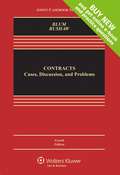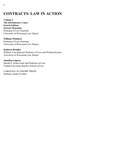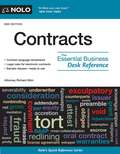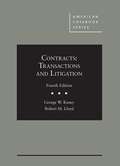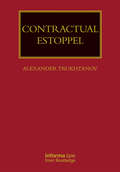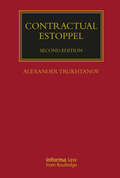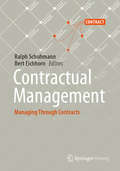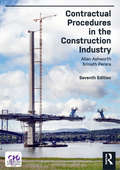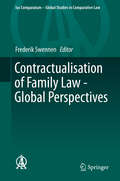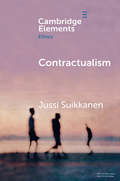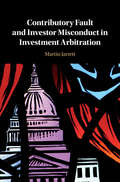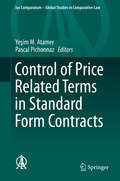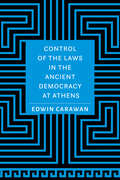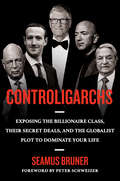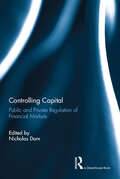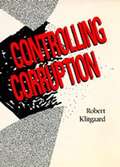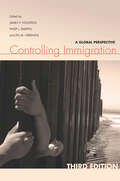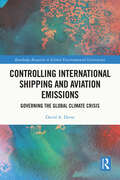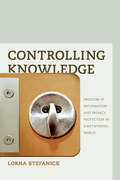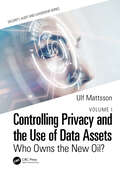- Table View
- List View
Contracts: Cases, Discussion, And Problems (Examples And Explanations Ser.)
by Brian A. BlumExamples and Explanations for Contract Law, Eighth Editionby Brian Blum provides new updates and additional cases for contract law in the student-loved Examples and Explanations format. The Examples and Explanations Series provides hypothetical questions complemented by detailed explanations that allow modern contract law students to test their knowledge of the topics and compare their own analysis to the provided explanation.
Contracts: Cases, Discussion, and Problems (Aspen Casebook)
by Brian Blum Amy BushawContracts: Cases, Discussion, and Problems, Fourth Editionis known for its strikingly clear, straightforward text that illuminates cases as well as concepts and theory. The book focuses on modern cases to expose students to contemporary contract law, but it also includes many important or iconic older cases. Numerous problems, ranging from simple to complex, supplement cases and introduce topics taught most effectively through problems. The casebook s traditional organization begins with formation and then corresponds to the sequence followed by the Restatement (2nd) of Contracts and treatises. Procedural issues are highlighted when presented by the cases and transactional issues such as drafting, client counseling, and negotiation are raised through the use of questions and small exercises throughout the text. Strengthening the text s focus on contemporary methods of contracting, modern issues in standard contracts are explored along with contracts entered into electronically. International and comparative material offers alternative approaches for students to consider, such as those taken by the United Nations Convention on Contracts for the International Sale of Goods (CISG) and the UNIDROIT Principles of International Commercial Contracts.
Contracts: Examples & Explanations (Sixth Edition)
by Brian A. BlumA thorough overview of Contracts, the fifth edition of this popular E&E for Brian Blum's extraordinarily lucid explanations of complex concepts. The Fifth Edition of Examples & Explanations: Contracts, builds on the framework established in earlier editions by providing an accessible, comprehensive treatment of the first-year contracts syllabus, written especially for students and designed to provide them with information, examples, and analysis of appropriate complexity and detail. In the fifth edition, the coverage of contracting through standard forms and electronic means is expanded, and new notes offer an international perspective on contract law. Thoroughly updated in its Fifth Edition, Examples & Explanations: Contracts features: the proven-effective Examples & Explanations format that combines explanatory text with hypothetical problems and answers a well-organized arrangement of topics that links the themes in each chapter so that students can see the interaction between different topics studied in the course informal and lucid text that articulates basic assumptions, explains the transactional context, and defines terminology sufficiently complex examples--many based on actual cases --that allow the reader to explore topics in depth flow charts and diagrams that illustrate key points and reinforce memory coverage of UCC Article 2 throughout the book expanded coverage of standard form contracts and contemporary forms of contracting via electronic communications and on the Internet new notes throughout the book that give student a perspective on how the rules of contract law may differ in other countries A gifted teacher and author, Brian Blum clarifies the principles, goals, policies, and legal rules of Contracts. The Examples & Explanations pedagogy gives the reader practice interpreting the contracts and applying the rules and principles to factual situations.
Contracts: Law in Action, Volume 1: The Introductory Course
by Stewart Macaulay Kathryn Hendley William WhitfordContracts: Law in Action (CLA) is unique among contracts casebooks for two reasons. First, it has a distinct methodological commitment the ''law in action'' approach pioneered by, among others, authors Macaulay and Whitford. CLA provides unique contextual background into such chestnut cases as Parker v. Twentieth Century Fox and Hoffman v. Red Owl. This context allows teachers to explore such issues as where cases come from and what impact they have on the parties and others. Second, unlike many other casebooks CLA offers detailed and challenging problem sets to help students develop both the basic analytic skills they need to succeed and the larger modes of inquiry that distinguish the best lawyers. CLA is the rare book that marries theory and practice in an engaging and accessible way.
Contracts: The Essential Business Desk Reference
by Richard StimUnderstand virtually any contract and sign on the dotted line with confidence. This is the first book to explain contract terms in language for the layperson. This indispensable A to Z guide covers: definitions of over 300 common terms found in contracts how to decipher the language of contracts which clauses are important and which aren't illegal and dangerous contract clauses to watch out for, and how to negotiate or change contracts. Contracts: The Essential Business Desk Reference will help you save money by explaining which clauses are important so that you can avoid a pricey professional review by a lawyer. Written in plain English, this book is especially useful for law students and business owners (including one-person operations and independent contractors), but still contains enough detail to have a place on nearly any lawyer's bookshelf.
Contracts: Transactions and Litigation (Fourth Edition) (American Casebook Series)
by George W. Kuney Robert M. LloydContracts: Transactions and Litigation (Fourth Edition), compares and contrasts the common law of contracts, the Restatement of the Law Second-Contracts, and Uniform Commercial Code Article 2 rules, as well as the United Nations Convention on Contracts for the International Sale of Goods and the UNIDROIT Principles of International Commercial Contracts, and explores their evolution and application.
Contractual Estoppel (Lloyd's Commercial Law Library)
by Alexander TrukhtanovThis book is the first comprehensive account of contractual estoppel. Contractual estoppel is a new and exciting development in the common law, widely employed and of considerable practical utility. The concept has been noticed by academics, mostly to be criticised as anomaly, misnomer and an objectionable policy choice, and commentary on the concept has been limited to recitation and critique of a few principal cases. Yet this book examines numerous judicial decisions which apply or discuss contractual estoppel, and offers a full and systematic exploration of its origin, principled basis, practical applications and limits. In this new title, the author, Alexander Trukhtanov, responds to policy objections and seeks to answer the charge that contractual estoppel is a misnomer, anomaly or distortion of reliance-based categories of estoppel, by showing that contractual estoppel is its own category of legal estoppel. The book is a single point of reference for a systematic and organised exposition of the subject and an explanation of how it fits into existing law. It is practice-oriented but engages with important conceptual points. Contractual Estoppel will be of interest to practitioners, whether draftsmen, litigators or advocates, as well as academics and post-graduate students of contract law.
Contractual Estoppel (Lloyd's Commercial Law Library)
by Alexander TrukhtanovThe second edition of this book continues to offer the first and only comprehensive account of contractual estoppel, now made fully up to date with reference to the most recent cases. Contractual estoppel, a new and exciting development in the common law, is ever more widely employed and keeps showing itself of considerable practical utility. The book examines numerous judicial decisions which apply or discuss contractual estoppel, and offers a full and systematic exploration of its origin, principled basis, practical applications and limits. The doctrine continues to develop and the second edition tracks, catalogues, discusses and explains its multifarious applications, limits and niceties. In this title, the author, Alexander Trukhtanov, maintains the principal doctrinal claim of the first edition that contractual estoppel is a not misnomer, anomaly or distortion of reliance-based categories of estoppel, but its own category of legal estoppel. The book is a single point of reference for a systematic and organised exposition of the subject and an explanation of how it fits into existing law. It is practice-oriented but engages with important conceptual points. Contractual Estoppel will be of interest to practitioners, whether draftsmen, litigators or advocates, as well as academics and post-graduate students of contract law.
Contractual Management: Managing Through Contracts
by Bert Eichhorn Ralph SchuhmannThe Concept Contractual Management offers a holistic approach to managerial decision-making based on contracts or business processes that are related to contracts. It explains management from the point of view of the contract, just as it interprets the contract from the point of view of management. Thus, the approach highlights the great inherent potential of contracts for managing companies, transactions and business relationships. The book addresses students as well as practitioners and gives insights into the usage of contracts to manage companies or relationships. It covers contract handling from preliminary deliberations to negotiations, implementation, and all the way to the evaluation of the contract within the company. Furthermore, it provides competencies to design and implement a contract and to organize the relevant processes. The Content In Part 1, the book explains the theoretical foundations of Contractual Management; in Part 2, the application of the approach is illustrated through case studies which cover various sectors, industries, company sizes, contract types, and management situations. Theory part: Contractual Management – A Holistic Approach to a Diverse Issue. Case study part: 11 case studies arranged according to specific contract-related topics: Information and Communication – Change – Enterprise Networks – Conflict – Accounting and Financing – Legal Compliance – Societal Steering. The Editors Professor Dr. Ralph Schuhmann: After holding a senior management position in industry, Ralph Schuhmann now teaches Business Law at Ernst-Abbe-Hochschule in Jena, Germany. He is the scientific director of the Contractual Management Institute at SRH Hochschule Berlin and has published various articles on contract law and contract management. Professor Dr. Bert Eichhorn: Before his appointment as professor for International Law and Business Law at SRH Hochschule Berlin, Bert Eichhorn worked as a legal consultant at the EU Parliament and as a lawyer. He has published numerous articles in national and international scientific journals in the area of contract management and international law. He is the managing director of the Contractual Management Institute at SRH Hochschule Berlin.
Contractual Procedures in the Construction Industry
by Srinath Perera Allan AshworthContractual Procedures in the Construction Industry 7th edition aims to provide students with a comprehensive understanding of the subject, and reinforces the changes that are taking place within the construction industry. The book looks at contract law within the context of construction contracts, it examines the different procurement routes that have evolved over time and the particular aspects relating to design and construction, lean methods of construction and the advantages and disadvantages of PFI/PPP and its variants. It covers the development of partnering, supply chain management, design and build and the way that the clients and professions have adapted to change in the procurement of buildings and engineering projects. This book is an indispensable companion for students taking undergraduate courses in Building and Surveying, Quantity Surveying, Construction Management and Project Management. It is also suitable for students on HND/C courses in Building and Construction Management as well as foundation degree courses in Building and Construction Management. Key features of the new edition include: A revised chapter covering the concept of value for money in line with the greater emphasis on added value throughout the industry today. A new chapter covering developments in information technology applications (building information modelling, blockchains, data analytics, smart contracts and others) and construction procurement. Deeper coverage of the strategies that need to be considered in respect of contract selection. Improved discussion of sustainability and the increasing importance of resilience in the built environment. Concise descriptions of some the more important construction case laws.
Contractualisation of Family Law - Global Perspectives (Ius Comparatum - Global Studies in Comparative Law #4)
by Frederik SwennenThis volume presents global and comparative perspectives on the perpetual pendular movement of family law between status and contract. It contributes to the topical academic debate on 'family law exceptionalism' by exploring the blurred lines between public law, private law and family law, and sheds light on the many shades of grey that exist. The contributions focus on both substantive and procedural family law on parents and children and on life partners, with particular attention for contractual arrangements of family formations and of conflict resolution. The hypothesis underlying all contributions was the trend towards contractualisation of family law. A convergent research outcome resulting from the comparison of national reports was the ambivalent position of family law in legal systems worldwide. That comparison shows that, whereas family law is clearly moving towards contract with regard to old family formations, the contrary is true for new family formations. The movement towards contract is rarely considered to be contractualisation pur sang, with civil effect. The movement towards status, finally, does not necessarily witness 'family law exceptionalism' vis-à-vis private law, in view of the increasing State interventionism in private law relations in general. In sum, as the volume shows, the high permeability of the demarcations between the State, the family and the market impedes a categorial approach. This volume is based on the general and selected national reports on the topic "Contractualisation of Family Law" that were presented at the XIXth International Congress of Comparative Law in Vienna in July 2014.
Contractualism (Elements in Ethics)
by Jussi SuikkanenThis Element begins by describing T.M. Scanlon's contractualism according to which an action is right when it is authorised by the moral principles no one could reasonably reject. This view has argued to have implausible consequences with regards to how different-sized groups, non-human animals, and cognitively limited human beings should be treated. It has also been accused of being theoretically redundant and unable to vindicate the so-called deontic distinctions. I then distinguish between the general contractualist framework and Scanlon's version of contractualism. I explain how the general framework enables us to formulate many other versions of contractualism some of which can already be found in the literature. Understanding contractualism in this new way enables us both to understand the structural similarities and differences between different versions of contractualism and also to see the different objections to contractualism as internal debates about which version of contractualism is correct.
Contributions to Law, Philosophy and Ecology: Exploring Re-Embodiments (Law, Justice and Ecology)
by Ruth Thomas-Pellicer Vito De Lucia Sian SullivanContributions to Law, Philosophy and Ecology: Exploring Re-Embodiments is a preliminary contribution to the establishment of re-embodiments as a theoretical strand within legal and ecological theory, and philosophy. Re-embodiments are all those contemporary practices and processes that exceed the epistemic horizon of modernity. As such, they offer a plurality of alternative modes of theory and practice that seek to counteract the ecocidal tendencies of the Anthropocene. The collection comprises eleven contributions approaching re-embodiments from a multiplicity of fields, including legal theory, eco-philosophy, eco-feminism and anthropology. The contributions are organized into three parts: ‘Beyond Modernity’, ‘The Sacred Dimension’ and ‘The Legal Dimension’. The collection is opened by a comprehensive introduction that situates re-embodiments in theoretical context. Whilst closely bound with embodiment and new materialist theory, this book contributes a unique voice that echoes diverse political processes contemporaneous to our times. Written in an elegant and accessible language, the book will appeal to undergraduates, postgraduates and established scholars alike seeking to understand and take re-embodiments further, both politically and theoretically.
Contributory Fault and Investor Misconduct in Investment Arbitration
by Martin JarrettInvestors must be held to account for their flawed contributions or otherwise wrongful conduct, but exactly what 'holding to account' means remains an enigma. Opinions vary on whether such circumstances are relevant to admissibility, jurisdiction, liability, or remedies. Reasoning from certain proposed axioms, this book suggests that such circumstances are only relevant to liability, meaning that the legal concepts that they activate, contributory fault and illegality, are defences. Three defences are identified: mismanagement, investment reprisal, and post-establishment illegality. While they might lack formal recognition, arbitral tribunals have implicitly applied them in multiple investment arbitrations. In detailing their legal content, special attention is paid to resolving the problems that they raise relating to causation, apportionment of liability, distinguishing these defences from their conceptual cousins, and arbitral tribunals' jurisdiction over pleas based on investor misconduct. The result is a restatement of the rules on contributory fault and investor misconduct applicable in investment arbitrations.
Control of Price Related Terms in Standard Form Contracts (Ius Comparatum - Global Studies in Comparative Law #36)
by Yeşim M. Atamer Pascal PichonnazThis book explores various approaches around the world regarding price term control, and particularly discusses the effectiveness of two major paths: ex ante regulatory and ex post judicial intervention. Price control and its limits are issues that affect all liberal market economies, as well as more regulated markets. For the past several years, courts in many different countries have been confronted with the issue of whether, and to what extent, they should intervene regarding price-related terms in standard form contracts – especially in the area of consumer contracts. Open price clauses, flat remunerations, price adjustment clauses, clauses giving the seller/supplier the right to ask for additional payments, bundling or partitioning practices, etc.: a variety of price related terms are used to manipulate customers’ choices, often also by exploiting their behavioral biases. The result is an unfavorable contract that is later challenged in court. However, invalidating a given price term in standard forms e.g. of a banking or utilities contract only has an inter partes effect, which means that in thousands if not millions of similar contracts, the same clauses continue to be used. Effective procedural rules are often lacking. Therefore, pricing patterns that serve to hide rather than to reveal the real cost of goods and services require special attention on the part of regulators. The aim of this book is to determine the various approaches in the world regarding price term control, and particularly to discuss the efficiency of both paths, ex ante regulatory and ex post judicial intervention. Thanks to its broad comparative analysis, this book offers a thorough overview of the methods employed in several countries. It gathers twenty-eight contributions from national rapporteurs and one supra-national rapporteur (EU) to the 2018 IACL Congress held in Fukuoka. These are supplemented by a general report presented at the same IACL Congress, which includes a comparative analysis of the national and supranational reports. The national contributors hail from around the globe, including Africa (1), Asia (5), Europe (17), the European Union (1) and the Americas (5).
Control of the Laws in the Ancient Democracy at Athens (Cultural Histories of the Ancient World)
by Edwin CarawanThe power of the court to overturn a law or decree—called judicial review—is a critical feature of modern democracies. Contemporary American judges, for example, determine what is consistent with the Constitution, though this practice is often criticized for giving unelected officials the power to strike down laws enacted by the people's representatives. This principle was actually developed more than two thousand years ago in the ancient democracy at Athens. In Control of the Laws in the Ancient Democracy at Athens, Edwin Carawan reassesses the accumulated evidence to construct a new model of how Athenians made law in the time of Plato and Aristotle, while examining how the courts controlled that process. Athenian juries, Carawan explains, were manned by many hundreds of ordinary citizens rather than a judicial elite. Nonetheless, in the 1890s, American apologists found vindication for judicial review in the ancient precedent. They believed that Athenian judges decided the fate of laws and decrees legalistically, focusing on fundamental text, because the speeches that survive from antiquity often involve close scrutiny of statutes attributed to lawgivers such as Solon, much as a modern appellate judge might resort to the wording of the Framers. Carawan argues that inscriptions, speeches, and fragments of lost histories make clear that text-based constitutionalism was not so compelling as the ethos of the community. Carawan explores how the judicial review process changed over time. From the restoration of democracy down to its last decades, the Athenians made significant reforms in their method of legislation, first to expedite a cumbersome process, then to revive the more rigorous safeguards. Jury selection adapted accordingly: the procedure was recast to better represent the polis, and packing the court was thwarted by a complicated lottery. But even as the system evolved, the debate remained much the same: laws and decrees were measured by a standard crafted in the image of the people. Offering a comprehensive account of the ancient origins of an important political institution through philological methods, rhetorical analysis of ancient arguments, and comparisons between models of judicial review in ancient Greece and the modern United States, Control of the Laws in the Ancient Democracy at Athens is an innovative study of ancient Greek law and democracy.
Control: The Dark History And Troubling Present Of Eugenics
by Adam RutherfordHow did an obscure academic idea pave the way to the Holocaust within just fifty years? Control is a book about eugenics, what geneticist Adam Rutherford calls “a defining idea of the twentieth century.” Inspired by Darwin’s ideas about evolution, eugenics arose in Victorian England as a theory for improving the British population, and quickly spread to America, where it was embraced by presidents, funded by Gilded Age monopolists, and enshrined into racist American laws that became the ideological cornerstone of the Third Reich. Despite this horrific legacy, eugenics looms large today as the advances in genetics in the last thirty years—from the sequencing of the human genome to modern gene editing techniques—have brought the idea of population purification back into the mainstream. Eugenics has “a short history, but a long past,” Rutherford writes. The first half of Control is the history of an idea, from its roots in key philosophical texts of the classical world all the way into their genocidal enactment in the twentieth century. The second part of the book explores how eugenics operates today, as part of our language and culture, as part of current political and racial discussions, and as an eternal temptation to powerful people who wish to improve society through reproductive control. With disarming wit and scientific precision, Rutherford explains why eugenics still figures prominently in the twenty-first century, despite its genocidal past. And he confronts insidious recurring questions—did eugenics work in Nazi Germany? And could it work today?—revealing the intellectual bankruptcy of the idea, and the scientific impossibility of its realization.
Controligarchs: Exposing the Billionaire Class, their Secret Deals, and the Globalist Plot to Dominate Your Life
by Seamus Bruner"Controligarchs peers into the future and provides a haunting and revelatory exposé of the globalist elite&’s playbook for the next five years.&”- Peter Schweizer, author of Red-Handed, Clinton Cash, and Profiles in CorruptionImagine a world in which you own nothing and rent everything. Most of the protein in your diet comes from bugs. You are not allowed to have more than one child, and your financial and medical data are instantly transferred to a centralized government database via a subdermal microchip.Controligarchs warns that this will be our existence if the supranational elites of the World Economic Forum get their way.In this book, investigative journalist Seamus Bruner—who led the teams whose findings sparked multiple FBI investigations and congressional probes into the Clintons and the Bidens—exposes the billionaires who control the levers of power that dominate every aspect of your life. Inside this pathbreaking new book, you will discover: Bill Gates&’s $11.7 billion food takeover scheme… and the real reason he&’s snapping up America&’s farmland Mark Zuckerberg&’s $36 billion plot to reengineer society and force you into tech addiction Jeff Bezos&’s taxpayer-funded electric vehicle ambitions, climate hypocrisy, and $1.2 billion plan to spy on you by overseeing your &“smart&” home The Soros family&’s project to use its $25 billion empire to influence elections and society for the next 50 years How World Economic Forum (WEF) founder Klaus Schwab built an exclusive club in Davos where the top 25 WEF members—now worth more than $10 trillion—have more economic power than most world governments, and how these global oligarchs are seizing control over our future Based on a mountain of financial filings, insider documents, and corporate records, Controligarchs rips back the curtain on never-before-published revelations about the life-altering schemes that globalist elites have in store for you. This book is a must-read for anyone who values American independence and personal freedom.
Controlling Administrative Power
by Peter CaneThis wide-ranging comparative account of the legal regimes for controlling administrative power in England, the USA and Australia argues that differences and similarities between control regimes may be partly explained by the constitutional structures of the systems of government in which they are embedded. It applies social-scientific and historical methods to the comparative study of law and legal systems in a novel and innovative way, and combines accounts of long-term and large-scale patterns of power distribution with detailed analysis of features of administrative law and the administrative justice systems of three jurisdictions. It also proposes a new method of analysing systems of government based on two different models of the distribution of public power (diffusion and concentration), a model which proves more illuminating than traditional separation-of-powers analysis.
Controlling Capital: Public and Private Regulation of Financial Markets
by Nicholas DornControlling Capital examines three pressing issues in financial market regulation: the contested status of public regulation, the emergence of ‘culture’ as a proposed modality of market governance, and the renewed ascendancy of private regulation. In the years immediately following the outbreak of crisis in financial markets, public regulation seemed almost to be attaining a position of command – the robustness and durability of which is explored here in respect of market conduct, European Union capital markets union, and US and EU competition policies. Subsequently there has been a softening of command and a return to public-private co-regulation, positioned within a narrative on culture. The potential and limits of culture as a regulatory resource are unpacked here in respect of occupational and organisational aspects, stakeholder connivance and wider political embeddedness. Lastly the book looks from both appreciative and critical perspectives at private regulation, through financial market associations, arbitration of disputes and, most controversially, market ‘policing’ by hedge funds. Bringing together a distinguished group of international experts, this book will be a key text for all those concerned with issues arising at the intersection of financial markets, law, culture and governance.
Controlling Corruption
by Robert KlitgaardCorruption is increasingly recognized as a preeminent problem in the developing world. Bribery, extortion, fraud, kickbacks, and collusion have resulted in retarded economies, predator elites, and political instability. In this lively and absorbing book, Robert Klitgaard provides a framework for designing anti-corruption policies, and describes through five case studies how courageous policymakers were able to control corruption.
Controlling Immigration: A Global Perspective, Third Edition
by Philip L. Martin James F. Hollifield Pia M. OrreniusThe third edition of this major work provides a systematic, comparative assessment of the efforts of a selection of major countries, including the U.S., to deal with immigration and immigrant issues— paying particular attention to the ever-widening gap between their migration policy goals and outcomes. Retaining its comprehensive coverage of nations built by immigrants and those with a more recent history of immigration, the new edition pays particular attention to the tensions created by post-colonial immigration, and explores how countries have attempted to control the entry and employment of legal and illegal Third World immigrants, how they cope with the social and economic integration of these new waves of immigrants, and how they deal with forced migration.
Controlling International Shipping and Aviation Emissions: Governing the Global Climate Crisis (Routledge Research in Global Environmental Governance)
by David A. DeeseThis book assesses the extent to which two specialized UN agencies- the International Maritime Organization (IMO) in London and the International Civil Aviation Organization (ICAO) in Montreal - have been able to regulate environmental pollution in the global commons. Since the Kyoto Protocol and its tasking of these two International Organisations (IOs) in 1997 to regulate greenhouse gas emissions from the fast-growing international shipping and aviation sectors, they have struggled with the assignment even as the external pressure has mounted for them to act. David Deese examines why these two UN agencies have largely failed to execute their critical missions to date and explores the most promising emerging and feasible routes to control and reduce these emissions by other means. Drawing on a range of sources including interviews with key actors in the IMO and ICAO, as well as from industry and national governments, Deese looks at the multifaceted politics that drive these IOs and considers how this has delayed and frustrated the execution of their assigned climate mitigation missions. He also explains how the limitations of the IMO and ICAO are likely to be found to a degree in other UN specialized agencies and examines how lessons learned here will be helpful in understanding the operations of other IOs. The book will be of great interest to students and scholars of global governance and international organisations, transport and environment and climate change. It will also be a useful resource for industry and non-profit experts and public officials working in shipping and aviation regulation.
Controlling Knowledge: Freedom of Information and Privacy Protection in a Networked World
by Lorna StefanickDigital communications technology has immeasurably enhanced our capacity to store, retrieve, and exchange information. But who controls our access to information, and who decides what others have a right to know about us? In Controlling Knowledge, author Lorna Stefanick offers a thought-provoking and user-friendly overview of the regulatory regime that currently governs freedom of information and the protection of privacy.Aiming to clarify rather than mystify, Stefanick outlines the history and application of FOIP legislation, with special focus on how these laws affect the individual. To illustrate the impact of FOIP, she examines the notion of informed consent, looks at concerns about surveillance in the digital age, and explores the sometimes insidious influence of Facebook. Specialists in public policy and public administration, information technology, communications, law, criminal justice, sociology, and health care will find much here that bears directly on their work, while students and general readers will welcome the book's down-to-earth language and accessible style.Intended to serve as a "citizen's guide," Controlling Knowledge is a vital resource for anyone seeking to understand how freedom of information and privacy protection are legally defined and how this legislation is shaping our individual rights as citizens of the information age. + Close
Controlling Privacy and the Use of Data Assets - Volume 1: Who Owns the New Oil? (Security, Audit and Leadership Series)
by Ulf Mattsson"Ulf Mattsson leverages his decades of experience as a CTO and security expert to show how companies can achieve data compliance without sacrificing operability." Jim Ambrosini, CISSP, CRISC, Cybersecurity Consultant and Virtual CISO "Ulf Mattsson lays out not just the rationale for accountable data governance, he provides clear strategies and tactics that every business leader should know and put into practice. As individuals, citizens and employees, we should all take heart that following his sound thinking can provide us all with a better future." Richard Purcell, CEO Corporate Privacy Group and former Microsoft Chief Privacy Officer Many security experts excel at working with traditional technologies but fall apart in utilizing newer data privacy techniques to balance compliance requirements and the business utility of data. This book will help readers grow out of a siloed mentality and into an enterprise risk management approach to regulatory compliance and technical roles, including technical data privacy and security issues. The book uses practical lessons learned in applying real-life concepts and tools to help security leaders and their teams craft and implement strategies. These projects deal with a variety of use cases and data types. A common goal is to find the right balance between compliance, privacy requirements, and the business utility of data. This book reviews how new and old privacy-preserving techniques can provide practical protection for data in transit, use, and rest. It positions techniques like pseudonymization, anonymization, tokenization, homomorphic encryption, dynamic masking, and more. Topics include Trends and Evolution Best Practices, Roadmap, and Vision Zero Trust Architecture Applications, Privacy by Design, and APIs Machine Learning and Analytics Secure Multiparty Computing Blockchain and Data Lineage Hybrid Cloud, CASB, and SASE HSM, TPM, and Trusted Execution Environments Internet of Things Quantum Computing And much more!

